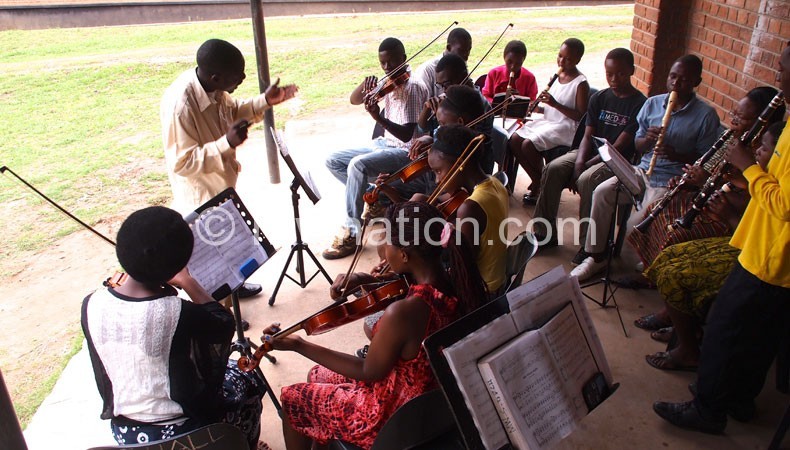‘Musical dream’ of Apostolic Church
All over the world, the New Apostolic Church has been known to emphasise on music; classical music, hymns and gospel, music education, orchestras and choirs.
In southern Africa, the strongest the South African and Zambian churches take a lead who have an advantage as their trainers in the church are professionals; mostly music teachers in universities, colleges and secondary schools and this makes them TO be far ahead of the Malawi church.

Here in Malawi the church has four orchestras based in Blantyre, Lilongwe, Mzimba and Mzuzu.
What started as a specialised interest in the churches 10 years ago soon turned into something remarkable.
Glyvin Maunde, who is the regional choir leader for the church in the Southern Region, goes around the church choirs in the region, teaching them new skills, both theoretical and practical.
Under his guidance, the choirs have reached a level that is rare for Malawi.
“Every church had its specialty; strings, brass, and so forth. In those orchestras, youngsters and adults started playing Western instruments such as strings—violins, violas, cellos and winds—flutes, clarinets, trumpets, trombones and tubas,” he explains.
According to Maunde, church members teach the youth the theoretical and practical aspects of music: staff reading, theory and harmony.
“In every orchestra or choir, there are advanced members who make musical arrangements on existing compositions or compose pieces for the choir or the orchestra.
“In the choirs, they focus on classical music and hymns. This is a deliberate choice; they want to improve their singers by singing those complicated and harmonic difficult pieces. They want them to become professional singers; they have to read staff notation to be able to sing those compositions,” he says.
Maunde’s aim is to find professional trainers and teachers for the orchestras, most likely from outside the church, sensing that this is the only way to improve the players.
For the past year, New Apostolic Church has been enlisting the help of a Belgian double bass player, Johan Vanhoutte, who is training the strings section.
Vanhoutte conducted a training week last summer at St Andrews High School where he drilled members of the youth on violins, cellos and even the double bass. Some of them were seeing the instrument for the first time, but on the last evening of the training, they were playing it in a concert! The public was totally amazed by the sound of the orchestra and the dedication of the players,” Maunde explains.
He adds: “When we hear the strings in the orchestra in church now, we can clearly see that his efforts paid off. Some of the members have joined Blantyre Music Society and play in the orchestra and sing in the choir. This is a good start, but I think we also have to find an expert for the wind instruments.”
Moses Chipanda, who is responsible for orchestras in the New Apostolic Church in Malawi, explains that music is held in high esteem and holds a crucial part in the church.
“It is for this reason that the church leadership would love to see the standard of our music develop to highest standards possible. All this is to create a glorious atmosphere for the congregation in honour of our heavenly father.
Chipanda notes that the church acknowledges that music is an art.
“In other countries, most of our church members are professional musicians and take a vital role in the church set-up. We have a few professionals in Malawi from within our church. They all got their passion ignited from the church set-up. The church encourages youngsters to pursue music as a career though this is limited in our country,” he says.
However, Chipanda decries the many challenges that dog the music profession in the country.
“There are many challenges we face in Malawi regarding music: lack of expertise, valid and professional human resource. Our economic status as a country makes it harder to develop. For instance, the amount we have to spend to acquire music equipment is a huge challenge,” he said, adding that the way forward for the country is to introduce music at primary school level.
“As a church, we groom a lot of people, but we need to encourage them to write formal exams and to go through official education programmes, also for this we need financial means. With sufficient qualifications they can become recognised music teachers who can teach in primary and secondary schools,” he says.
According to Chipanda, although the objective of the church is spiritual, they also dream of ensuring that Malawi has a New Apostolic Church symphonic orchestra by the end of 2016.
“We don’t aim at just numbers, but a quality group; well-trained musicians who know their place in an orchestra and can stand next to our colleagues from abroad.
“I am sure this will be the first complete classical orchestra in Malawi. It certainly would attract youngsters to this sort of music and, in the long run, the whole of Malawi would benefit from it. But we have to be realistic in our goals, it will take time, commitment and financial resources, but where there’s a will, there’s a way…”





